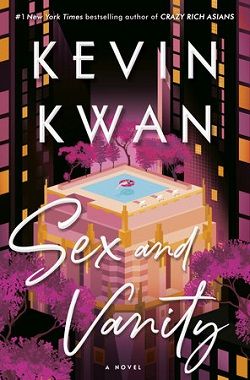Summary

Sex and Vanity
by Kevin Kwan
On her very first morning on the jewel-like island of Capri, Lucie Churchill sets eyes on George Zao and she instantly can’t stand him. She can’t stand it when he gallantly offers to trade hotel rooms with her so that she can have the view of the Tyrrhenian Sea, she can’t stand that he knows more about Curzio Malaparte than she does, and she really can’t stand it when he kisses her in the darkness of the ancient ruins of a Roman villa and they are caught by her snobbish, disapproving cousin, Charlotte. “Your mother is Chinese so it’s no surprise you’d be attracted to someone like him,” Charlotte teases.
Daughter of an American-born-Chinese mother and blue-blooded New York father, Lucie has always sublimated the Asian side of herself in favor of the white side, and she adamantly denies having feelings for George. But several years later, when George unexpectedly appears in East Hampton where Lucie is weekending with her new fiancé, Lucie finds herself drawn to George again. Soon, Lucy is spinning a web of deceit that involves her family, her fiancé, the co-op board of her Fifth Avenue apartment, and ultimately herself as she tries mightily to deny George entry into her world–and her heart.
.
Read
Sex and Vanity on http://kissnovel.net
Martial Peak Reviews
Kevin Kwan’s Sex and Vanity is a dazzling exploration of identity, privilege, and the complexities of love, set against the backdrop of the opulent world of the elite. Following the success of his previous works, particularly the wildly popular Crazy Rich Asians, Kwan returns with a narrative that is both a love story and a sharp social commentary, wrapped in a glossy package of humor and wit.
The story centers around Lucie Churchill, a young woman caught between two worlds: her American upbringing and her Chinese heritage. From the very first pages, Kwan immerses readers in the luxurious setting of Capri, where Lucie meets George Zao, a character who embodies the very essence of the cultural clash that defines Lucie’s life. Their initial encounter is fraught with tension; Lucie’s disdain for George is palpable, yet it is clear that there is an undeniable chemistry between them. This dynamic sets the stage for a narrative that delves deep into the themes of attraction, societal expectations, and self-identity.
One of the most compelling aspects of Sex and Vanity is its exploration of identity. Lucie’s struggle with her mixed heritage is a central theme that resonates throughout the novel. Kwan deftly portrays her internal conflict as she grapples with the expectations of her blue-blooded New York family and her own cultural background. Lucie’s journey is not just about romantic entanglements; it is a profound exploration of self-acceptance and the desire to belong. Kwan’s writing shines in these moments, as he captures the nuances of Lucie’s feelings with sensitivity and insight.
The character development in the novel is rich and layered. Lucie is a well-crafted protagonist whose flaws and insecurities make her relatable. Her initial rejection of George is not merely a reflection of her personal biases but is also indicative of the societal pressures that dictate her choices. As the story unfolds, Lucie’s character evolves, and readers witness her struggle to reconcile her feelings for George with her desire to conform to her family’s expectations. This internal battle is mirrored by the external conflicts she faces, particularly with her snobbish cousin Charlotte, who embodies the elitist attitudes that Lucie is trying to escape.
George Zao, on the other hand, serves as a foil to Lucie. He represents authenticity and a connection to culture that Lucie is both drawn to and repelled by. Kwan skillfully develops George’s character, allowing readers to see his depth and complexity. His passion for art and history, coupled with his genuine affection for Lucie, makes him a compelling love interest. The tension between Lucie and George is palpable, and their interactions are charged with a mix of attraction and misunderstanding that keeps readers engaged.
The novel also tackles the theme of privilege and the social hierarchies that exist within both American and Asian cultures. Kwan’s sharp wit and keen observations highlight the absurdities of wealth and status, particularly through the lens of Lucie’s family and their social circle. The lavish parties, designer labels, and extravagant lifestyles serve as a backdrop for a deeper commentary on the emptiness that often accompanies such privilege. Kwan’s ability to blend humor with critical social commentary is one of the hallmarks of his writing, and it is on full display in this novel.
As Lucie navigates her relationships, particularly with her fiancé, the stakes become increasingly high. The web of deceit she spins is not just about hiding her feelings for George; it is also about protecting her carefully constructed identity. Kwan masterfully builds tension as Lucie’s lies threaten to unravel, leading to a climax that is both satisfying and thought-provoking. The resolution of Lucie’s journey is not just about choosing between two men; it is about choosing herself and embracing her identity in all its complexity.
In comparison to Kwan’s previous works, Sex and Vanity offers a more introspective look at its characters, moving beyond the surface-level extravagance that characterized Crazy Rich Asians. While both novels share a focus on the lives of the wealthy, Kwan’s latest offering delves deeper into the emotional and psychological struggles of its protagonist. This shift in focus allows for a richer narrative that resonates on a more personal level.
Overall, Sex and Vanity is a captivating read that combines romance, humor, and social critique in a way that only Kevin Kwan can achieve. The novel’s exploration of identity, privilege, and the complexities of love makes it a relevant and timely story. Kwan’s sharp prose and vivid descriptions transport readers to the sun-soaked shores of Capri, while his insightful commentary encourages reflection on the nature of belonging and self-acceptance.
For those who enjoy stories that challenge societal norms while providing a glimpse into the lives of the elite, Sex and Vanity is a must-read. Kwan has once again proven himself to be a master storyteller, and this novel solidifies his place as a significant voice in contemporary literature.
























Reviews 0
Post a Reviews: